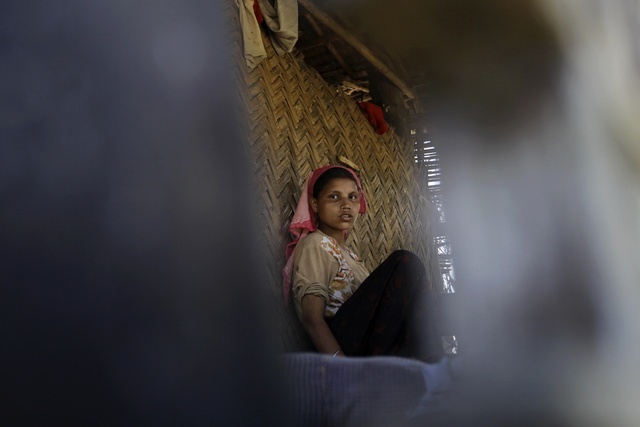Doubts have been cast doubt on the Burmese government’s latest commitment to implement a “long-term” rehabilitation strategy in Arakan state, where Buddhists continue to oppose reintegration with the stateless Muslim Rohingya after two bouts of ethno-religious clashes last year.
Many residents say they will not accept the construction of new houses for displaced Muslims unless they can verify their citizenship under the controversial 1982 citizenship law, which renders the Rohingya stateless.
“We have no problem with building homes for those who qualify as citizens under the existing law but we wouldn’t want to see illegal immigrants from a foreign land being given homes,” a Buddhist from the state capital Sittwe told DVB. “There were protests in the past in several different towns over this issue.”
On Tuesday, President Thein Sein announced the formation of a government-led committee to oversee the reconstruction of houses for many of the 125,000 people, who lost their homes in last year’s violence, before the onset of the rainy season.
Thein Sein pledged to boost access to livelihoods and seek to reduce the army’s presence in the region, where it is currently tasked with segregating Muslims and Buddhists. But serious questions remain over whether the government will be able to follow through on its promises.
Local sources say the government has in fact stepped up travel restrictions on Muslims in the region, including preventing Kaman Muslims, who are Burmese citizens, from travelling outside their townships. Sittwe’s Muslim quarter, Aung Mingalar, has reportedly been completely isolated from foreign journalists.
Hla Maung Thein, a member of the Rakhine Nationalities Development Party (RNDP), told DVB that while Rohingyas should be provided with “some kind of help”, it should not be too much.
“They should be provided temporary shelter, since it might be hard for them during the monsoon, but giving them too much could spark riots,” he said.
It follows reports that Burma rejected an offer by the Turkish government to re-build around 5,000 houses for displaced Muslim Rohingya, who bore the brunt of last year’s violence, after local protests. A government spokesperson also accused non-displaced Rohingyas of “sneaking” into camps at night in order to obtain housing assistance from Turkey.
“Some of them are not actually refugees who lost their homes during the violence,” a Ministry of Information spokesperson, Win Myaing, told Eleven Media. “Some people say they entered the camps secretly at night. Turkey made the offer to build houses for Bengali [Rohingya] refugees, but we rejected it.”
The Turkish embassy could not be reached for comment. But human rights activists have slammed the government for persistently blocking aid to Muslim Rohingya, who they warn will face a “humanitarian crisis” unless adequate shelter is provided before the onset of rainy season in June.
“Arakan state authorities’ shameful excuses for blocking much needed aid to displaced Rohingya get more outrageous day-by-day,” warned deputy Asia director of Human Rights Watch, Phil Robertson.
“Instead of focusing on who is entering the camps, the state authorities should be spending their time tracking down Rakhine instigators who continue to make violent threats against international humanitarian agencies, including allegedly threatening to burn down any houses constructed with Turkish aid.”
Local sources suggest that the Turkish government is seen as too closely linked to the Organization for Islamic Cooperation (OIC), which sparked nation-wide protests last year after it offered to set up a humanitarian liaison office in Sittwe.
Chris Lewa, head of the Arakan Project, told DVB that many of the Rohingya camps “will be completely flooded” at the onset of rainy season.
“The government does not seem to be willing to move these people to higher ground,” she said, adding that the local Arakanese population just wants “to get them out”.
But she agreed that the number of displaced Rohingyas “is rising” even though there have been no major outbreaks of violence since October last year. Most of them, she says, are casual workers, including fishermen and farmers, who have lost access to their lands and livelihoods.
“They lost their jobs so they have had to sell their belongings, including their houses – we’ve seen many dismantled in the villages so they can sell the wood,” she said after returning from a visit to Sittwe in late March.
A number of regional political parties and religious leaders continue to drive xenophobic hate-campaigns against the Rohingya, who are considered “illegal Bengali immigrants” by the government and many local Arakanese.
According to government statistics, more than 10,000 homes and buildings were destroyed in last year’s violence, which pitted Muslim Rohingya against Buddhist Arakanese in Burma’s worst sectarian violence in decades.
The UN has repeatedly called on the government to take effective steps to reduce local hostility and state-sponsored discrimination against the Rohingya.



